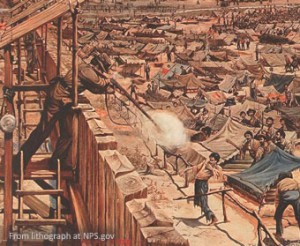By Andy Brack | The Civil War is alive every day for reporters and editors — and they may not even know it.
![]() A couple of weeks back in a commentary taking the General Assembly to task for caterwauling about a court-imposed time limit on school funding, I observed how reporters face “deadlines” all of the time, just as courts impose deadlines frequently.
A couple of weeks back in a commentary taking the General Assembly to task for caterwauling about a court-imposed time limit on school funding, I observed how reporters face “deadlines” all of the time, just as courts impose deadlines frequently.
I got to wondering about how the word “deadline” came about. I was surprised to learn it appears to have come from Civil War prison camps.
According to reference.com, the word is newspaper jargon dating from around 1920, but apparently was influenced by a “do-not-cross” line in Civil War prisoner-of-war camps. Prisoners who crossed the a particular line were shot dead.
In 1865, Swiss-born Confederate Capt. Henry Wirz commanded Camp Sumter, a miserable prisoner-of-war camp near Andersonville, Ga. Intended as a temporary camp when established in February 1864, it became a place known for deplorable, overcrowded conditions — little food, potable water, poor sanitation, disease and minimal shelter. Some 45,000 Union prisoners arrived at the camp; almost 13,000 died, according to the National Park Service.
When the Union army arrived in May 1865, U.S. Cavalry Capt. Henry E. Noyes arrested Wirz and took him to Washington for trial on charges of conspiring to destroy federal prisoners and “murder, in violation of the laws and customs of war.” Wirz was convicted and executed in November 1865.
 During the trial, it came out that Wirz “did establish and cause to be designated within the prison enclosure containing said prisoners a ‘dead line,’ being a line around the inner face of the stockade or wall enclosing said prison and about twenty feet distant from and within said stockade,” according to an Army report on the trial. Guards were told to kill any prisoner who touched, fell on or crossed the “dead line” that limited their movements.
During the trial, it came out that Wirz “did establish and cause to be designated within the prison enclosure containing said prisoners a ‘dead line,’ being a line around the inner face of the stockade or wall enclosing said prison and about twenty feet distant from and within said stockade,” according to an Army report on the trial. Guards were told to kill any prisoner who touched, fell on or crossed the “dead line” that limited their movements.
Dead-lines were not unique to Andersonville, according to the Park Service. There was even one on Morris Island near Charleston. A Union prisoner-of-war camp known as Camp Douglas (1863-65) in Chicago also apparently had a “dead line.” According to Wikipedia, “a few prisoners were wounded or killed by guards who saw them step over the “dead line” near the boundaries of the camp or commit minor offenses, but such occurrences occurred infrequently.”
As time passed, the term “deadline” seems to have been picked up by the newspaper business to indicate how serious a particular time limit was for a story.
Now we know!
Friday’s commentary in Statehouse Report focused on the newest elected member of the Charleston County legislative delegation. Margie Bright Matthews won seven out of every eight votes in last week’s special general election to replace slain Sen. Clementa Pinckney, whose district stretches from southern Charleston County to Jasper County.
Bright Matthews, who is supposed to be sworn in today, said she remembers getting angry when she heard about the death of Pinckney and eight members of his Charleston congregation.
“Then I thought, ‘Don’t get mad. Do something about it.’” she reflected this week after election excitement was wearing off and turning into a sense of being slightly overwhelmed by new responsibilities.
“I decided [then] that I can do this. It’s another way for me to serve.”
- Click here to read the rest of the column about Margie Bright Matthews.
Andy Brack is editor and publisher of Charleston Currents and Statehouse Report. You can reach him at: editor@charlestoncurrents.com




 We Can Do Better, South Carolina!
We Can Do Better, South Carolina!
























